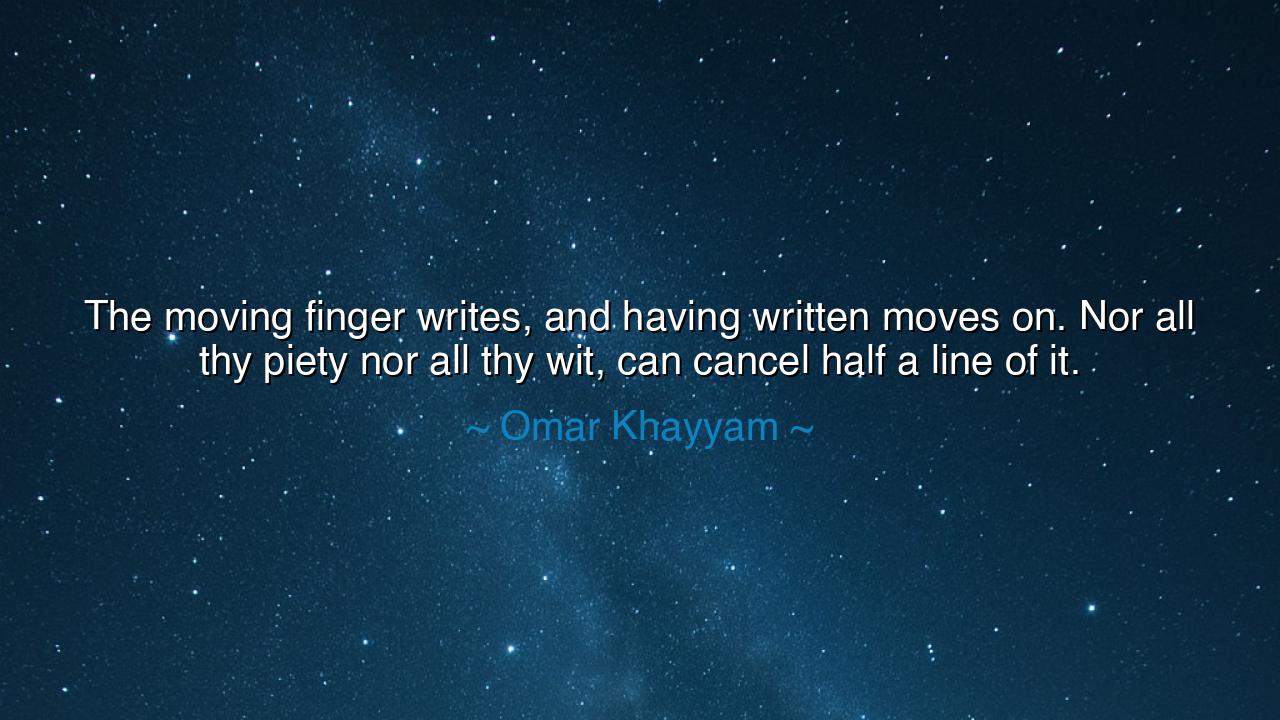
The moving finger writes, and having written moves on. Nor all
The moving finger writes, and having written moves on. Nor all thy piety nor all thy wit, can cancel half a line of it.






Omar Khayyam, the poet, mathematician, and seer of Persia, spoke words that carry the weight of eternity when he wrote: “The moving finger writes, and having written moves on. Nor all thy piety nor all thy wit, can cancel half a line of it.” In this vision he reveals the inexorable truth of time and destiny: that each moment once lived, each deed once done, each word once spoken, is inscribed upon the scroll of existence and cannot be erased. Life advances like the hand of a scribe writing across the parchment; it does not pause, it does not turn back. What is written remains, and no prayer, no wisdom, no plea can undo it.
The ancients knew this truth well. The Greeks spoke of the Fates, who spun, measured, and cut the thread of life without bending to the will of men or gods. The Hebrews wrote that “what is crooked cannot be made straight, and what is lacking cannot be numbered.” Omar Khayyam gives this ancient law a poet’s form: time is the hand that writes without erasure. To recognize this is both humbling and sobering, for it strips man of illusions of control, reminding him that the past belongs not to him, but to eternity.
Consider the tale of King David. He was a man of strength, a shepherd who became king, a poet who sang to God. Yet when he sinned, sending a man to death and taking what was not his, the deed could not be unwritten. Though he repented in ashes and tears, though he prayed with all his heart, the line was inscribed in the book of life. Forgiveness he gained, but erasure he did not. This is the essence of Khayyam’s wisdom: acts may be redeemed, but never undone.
History also gives us the story of Julius Caesar, who, crossing the Rubicon, set into motion the fall of the Republic. Once the river was crossed, the deed was sealed; Rome’s destiny was changed forever. No wit of statesmen, no prayers of senators, could “cancel half a line of it.” The moving finger had written, and history advanced with it. So too in our lives: decisions once made, words once uttered, cannot be reclaimed. We are bound to live with their consequences.
Yet Khayyam’s words are not meant only as lamentation. They are also a call to wisdom. Since the moving finger does not pause, since the line cannot be erased, man must walk carefully, with awareness and integrity. Each choice becomes sacred, for it will live beyond the moment. To recognize that life writes without erasure is to live with reverence, weighing words before speaking, and deeds before doing. The past cannot be undone, but the present is still unformed, and the future still awaits its inscription.
This truth also offers freedom. For while we cannot erase the lines already written, we can choose what is written next. Despair over the past binds us, but wisdom says: let the hand write anew. The man who has erred may yet write redemption; the woman who has suffered may yet write resilience. Though the finger does not erase, it continues to move—and in its movement lies hope, for tomorrow is unwritten.
The lesson is clear: honor the pen of time. Accept what has been written, neither clinging to regret nor pleading for erasure. Instead, turn to the lines yet to be inscribed, and fill them with courage, truth, and compassion. Do not waste your life in wishing to undo, but spend it in striving to create anew. For Omar Khayyam’s wisdom declares that life’s record is inexorable, but its story is still unfolding—and the noblest chapters may yet be written by your hand.
Practical action flows from this: Live with intention, knowing that each word and deed leaves a mark that cannot be erased. Let your choices be guided by love, not haste; by wisdom, not impulse. When you err, seek forgiveness, not erasure, and then go forward with renewed resolve. And above all, embrace the truth that the moving finger will write until your final breath—so write upon the scroll of time not shame, but greatness, not bitterness, but light. For in this way, you will transform the inevitability of fate into the beauty of legacy.






AAdministratorAdministrator
Welcome, honored guests. Please leave a comment, we will respond soon